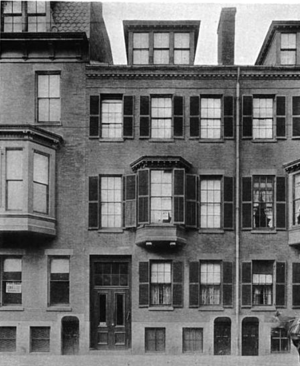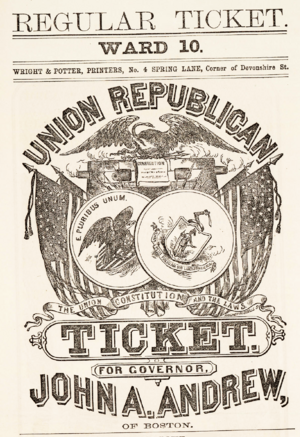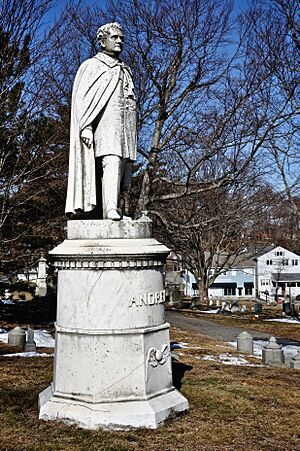John Albion Andrew facts for kids
Quick facts for kids
John Albion Andrew
|
|
|---|---|
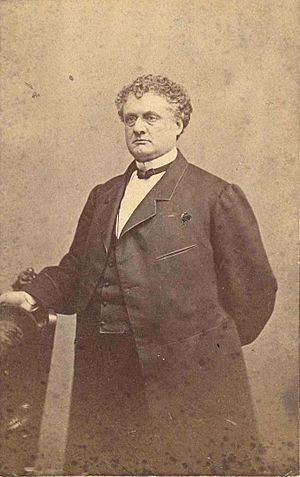
Carte de visite portrait of 25th Governor of Massachusetts John A. Andrew (1818-1867, served 1861-1866), by J. W. Black, of Boston
|
|
| 25th Governor of Massachusetts | |
| In office January 3, 1861 – January 4, 1866 |
|
| Lieutenant | John Z. Goodrich John Nesmith Joel Hayden |
| Preceded by | Nathaniel P. Banks |
| Succeeded by | Alexander H. Bullock |
| Member of the Massachusetts House of Representatives | |
| In office 1857–1859 |
|
| Personal details | |
| Born | May 31, 1818 Windham, Massachusetts (now Windham, Maine) |
| Died | October 30, 1867 (aged 49) Boston, Massachusetts |
| Political party | Whig (1840–1848) Free Soil (1848–1854) Republican (1854–1867) |
| Spouse | Eliza Jane Hersey |
| Children | John F. Andrew |
| Profession | Lawyer |
| Signature | |
John Albion Andrew (born May 31, 1818 – died October 30, 1867) was an American lawyer and politician from Massachusetts. He became the 25th Governor of Massachusetts in 1860. He served from 1861 to 1866, leading the state during the American Civil War (1861-1865). Andrew was a key figure in creating some of the first African-American military units. This included the famous 54th Massachusetts Infantry.
Andrew studied at Bowdoin College. From a young age, he was a strong abolitionist, meaning he was against slavery. He often defended enslaved people who had escaped. He also helped John Brown after his 1859 raid on Harpers Ferry. This made Andrew well-known and helped him become governor. He often disagreed with President Abraham Lincoln about the war. Andrew pushed Lincoln to end slavery. Later, his views became more moderate. He supported the Reconstruction plans of Lincoln's successor, Andrew Johnson.
In Massachusetts, Andrew was against the Know Nothing movement. He also opposed strict laws against alcohol. He oversaw the state taking over the Hoosac Tunnel building project. In 1865, he signed a law that created the Massachusetts State Police. This was the first statewide police force in the nation. He died suddenly at age 49.
Contents
Early Life and Education
John Albion Andrew was born in Windham, which is now in Maine. At the time, it was part of Massachusetts. He was born on May 31, 1818, the oldest of four children. His father, Jonathan Andrew, ran a successful merchant business. His mother, Nancy Green Pierce, was a teacher.
Andrew first learned at home. Then he went to several boarding schools. After his mother passed away in 1832, he attended Gorham Academy. As a teenager, he was very good at remembering things and public speaking. He could memorize church sermons and repeat them just like the speaker. He also learned about the early abolitionist writings of William Lloyd Garrison. Andrew started at Bowdoin College in 1833. He was a good student and popular, but not at the top of his class.
After graduating in 1837, Andrew moved to Boston. He studied law there with Henry H. Fuller. He became a lawyer in Massachusetts in 1840 and started his own law practice.
Fighting Slavery Through Law and Politics
After becoming a lawyer, Andrew joined the Whig Party. He became very active in the movement to end slavery. He was part of the first vigilance committee in Boston. This group was formed in 1846 to help enslaved people who had escaped. Andrew also helped create the Free Soil Party in 1848. This party wanted to stop slavery from spreading into new western territories.
In 1847, Andrew met Eliza Jane Hersey. They got married on Christmas evening in 1848. They had four children: John Forrester, Elizabeth Loring, Edith, and Henry Hersey.
After the Fugitive Slave Act of 1850 passed, more people joined the Boston Vigilance Committee. This law made it harder for escaped slaves to be free. Andrew helped with the legal defense of people accused of being escaped slaves. By 1855, his law practice was doing well. He bought a house on Charles Street in Boston.
In 1854, Andrew helped defend one of the men arrested for trying to rescue Anthony Burns. Burns was an escaped slave. The Kansas–Nebraska Act also passed that year. This law allowed slavery in new territories, which angered many. Andrew defended a poor mixed-race man in a murder case for free.
Andrew helped form the Republican Party in Massachusetts in 1854. In 1857, Andrew was elected to the Massachusetts General Court. He became a leading voice against slavery. He pushed to remove Judge Edward G. Loring from office. This was because of Loring's actions in the Burns case. Andrew became very popular in the state Republican party. He was chosen to lead the 1858 state Republican convention.
After John Brown's raid on Harpers Ferry in 1859, Andrew helped organize legal aid for Brown. He felt sympathy for Brown's cause, even if not his actions. Andrew's efforts for Brown made him well-known across Massachusetts. He was even called to testify before the United States Senate. Andrew also helped raise money for Brown's family. His actions made him very popular in Massachusetts. The Republican Committee published his speeches to share with voters.
Andrew's popularity led him to be chosen to lead the Massachusetts group at the 1860 Republican National Convention. He was nominated for governor that year. He won the election against Amos Adams Lawrence.
Governor During the Civil War
When Andrew became governor on January 2, 1861, the American Civil War was about to begin. He was a strong voice, pushing President Abraham Lincoln to fight the war hard and end slavery.
Soon after taking office, Andrew started preparing the Massachusetts militia for war. He chose strong leaders and bought new weapons and supplies. He also urged the governors of Maine and New Hampshire to prepare. When the war started, he improved the state's coastal defenses. He got bank loans to pay for this without federal approval. In late 1861, Andrew had a public disagreement with General Benjamin Butler. Andrew won, and he refused to appoint Butler's choices for officers.
Andrew often spoke about the need to end slavery. When Lincoln announced the Emancipation Proclamation in September 1862, Andrew supported it. He called it "a poor document but a mighty act." He wished it had been broader and faster. Andrew was a key leader at the War Governors' Conference in September 1862. This meeting supported the Emancipation Proclamation and the war effort.
Andrew strongly pushed for black men to join the Union Army. The state legislature was at first unsure about this. Frederick Douglass had supported this idea from the start of the war. Andrew saw it as a step towards equality. It also helped fill the state's soldier quotas. In January 1863, Andrew got permission to raise a black regiment. Because Massachusetts had a small black population, the 54th and 55th Massachusetts regiments included black soldiers from other states. Andrew wanted black officers, but this was not allowed. Instead, he chose officers who strongly opposed slavery. He also supported the soldiers' fight for equal pay.
By the end of the war, Andrew's political views became more moderate. In late 1865, he supported President Andrew Johnson's Reconstruction plans. This caused a disagreement with his friend, Charles Sumner. Andrew decided not to run for reelection in 1865. In his last speech as governor, he shared his ideas for Reconstruction. He did not say that black citizens must be able to vote before Southern states could rejoin Congress.
Massachusetts Issues During the War
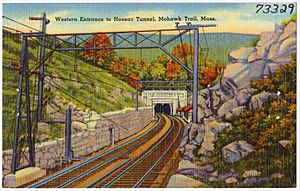
Andrew had support from many ordinary people. But he also needed the support of Boston's wealthy families to govern. Many of his military advisors came from these elite families. This caused some unhappiness among his supporters.
The building of the Hoosac Tunnel was a big issue during Andrew's time as governor. The state had loaned money to the project. In 1861, Andrew refused to sign a bill for more funding. He did not trust the tunnel's chief engineer. The state took over the project in 1862. It was finally finished in 1875.
Andrew also dealt with the Know Nothing movement. This group was against immigrants. In 1859, a law was passed that made new citizens wait two years to vote. This law was later removed in 1862–1863. Andrew also supported the charter for the College of the Holy Cross, a Catholic college. He attended its first graduation ceremony. He also allowed immigrant groups to form militia companies. This helped the war effort. In 1863, Andrew sent troops to protect Union armories in Boston. This was during a riot by Irish Catholics in the North End.
In 1865, a statewide police force was created. This was the Massachusetts State Police, the first of its kind in the nation. Andrew signed the law that created it.
After Being Governor
After leaving office, Andrew went back to practicing law. He wanted to stay active in politics. In 1866, he decided not to run for chairman of the state Republican Party. This was because President Johnson was attacking Charles Sumner.
In 1867, Andrew represented businessmen who wanted to change the state's strict alcohol laws. His successor, Alexander Bullock, was very strict about these laws. Andrew spoke for six weeks before a legislative committee. His efforts were used by Democrats in the 1867 governor's election.
Governor Andrew passed away suddenly on October 30, 1867, at his home in Boston. He was first buried in Mount Auburn Cemetery. Later, his remains were moved to the Hingham (Old Ship) Cemetery in Hingham. His grave has a large statue.
Honors and Memorials
- Andrew Square in South Boston is named after him.
- John A. Andrew St. in the Jamaica Plain area of Boston is named in his honor. His name is also on the Soldier's Memorial there.
- John Andrew Hospital at Tuskegee University in Tuskegee, Alabama is named for him.
- In 2007, Governor Deval Patrick hung Andrew's portrait in his office, calling him an inspiration.
- John A. Andrew School in Windham, Maine, is named for him.
 | Janet Taylor Pickett |
 | Synthia Saint James |
 | Howardena Pindell |
 | Faith Ringgold |


